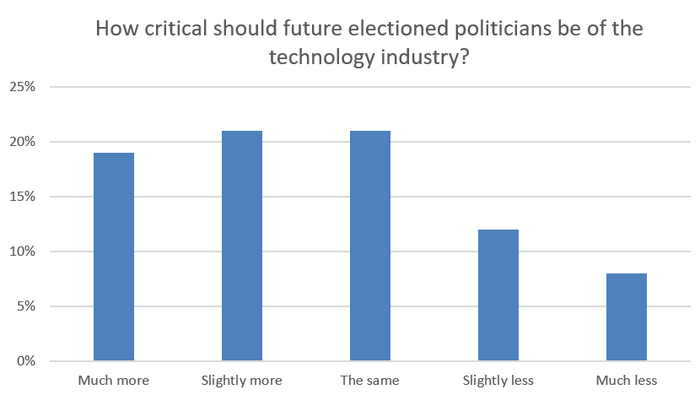US general public in favour of breaking up Big Tech
The technology industry has caught the sharp-end of the stick from point-scoring politicians in recent months, however it does appear the aggressors are representative of the people.
September 23, 2019

The technology industry has caught the sharp-end of the stick from point-scoring politicians in recent months, however it does appear the aggressors are representative of the people.
It should not be considered unusual to see some of the rhetoric stepped-up a level with the Democratic Presidential Candidate heating-up, though that could only be the tip of the iceberg. Recent election campaigns have seemingly specialised in grand promises, see Brexit and 2016 Presential Election, and there is little evidence sanity will be restored to the political arena.
The technology industry is an easy target for these imposing statements, and this seems unlikely to change.
According to research from think tank Data for Progress, almost two-thirds of the US general public support the notion of breaking-up big tech. And worryingly for the residents of Silicon Valley, the boundaries of political divide seem to matter very little. It does appear everyone has it in for Big Tech.
Of those who identify as in support of the Democrat party, 29% and 34% either strongly or somewhat support the break-up of big tech to encourage more competition. For Republican supporters, the numbers are 29% and 31%, and for those who identify as independent, 32% and 34% support the move.
These questions are quite generalist, but there is support to tackle the growing influence of Silicon Valley and its powerful residents. One of the reasons for this might be the highly-publicised data scandals which has dominated headlines over the last 12-18 months. The frequency of these incidents does not paint a favourable light on the ability or attitude of Big Tech.
More interesting research which builds this momentum comes from research firm Morning Consult.

As you can see from the graph above, the majority of respondents to the survey either support the continuation of the current scrutiny of the technology industry or would want to see it increased. Considering the current political position is uncomfortable for Big Tech, these numbers will not be soothing.
Interestingly enough, perhaps the biggest aggressor from the Democrat side of the political arena is gathering momentum in the battle for a nomination. Former Vice-President Joe Biden might have been the bookies favourite for the Democrat nomination for some time, though it appears Massachusetts Senator Elizabeth Warren is putting-up a very credible challenge.
Polling data from CNN suggests Warren is leading the race for the Democrat nomination, though this position could gather momentum as the process unfolds. As more potential nominees drop out of the race, votes will be dispersed amongst the remaining contenders; 20% have selected Warren as their next-best choice, with Biden only collecting 10% of the reshuffled votes.
It is way too early to make any predictions regarding the nominees or the outcome of the 2020 election, though there is another forecast worth bearing in mind. According to Real Clear Politics, a website which aggregates polling opinions from different news outlets in the US, if the election was to be held tomorrow, Warren would beat Trump, however Biden would lose comprehensively.
Again, this data has to be taken with a pinch of salt, there is a lot which can change over the next twelve months, but some will be sitting uncomfortably in Silicon Valley. Traditionally, the Democrat party has been much more politically aligned with the emerging technology segment, though Warren is one of the most aggressive critics.
Announcing her intention to compete for the keys to the White House in March, Warren has made the issue of Big Tech the focal point of her campaign. This is the big-ticket promise that we mentioned earlier in the article; Warren was one of the first to suggest the break-up of Big Tech and the reversal of acquisitions which look anti-competitive with the benefit of hindsight.
Since this point, the critical crowd has grown. The FTC is investigating Facebook for its acquisitions of WhatsApp and Instagram, as is the House Judiciary Committee. Google is at the centre of a Department of Justice and House Judiciary Committee enquiry. The Apple App Store is facing an anti-competition probe, and Amazon’s eCommerce platform is under investigation as well.
Although all of these investigations are geared towards the activity of a single company, the outcome will set precedent which can be applied throughout the rest of the industry. If one loses, everyone in Silicon Valley is exposed to the same dangers.
Big Tech bosses might have expected the criticism and scrutiny would have continued, though these individuals might not have thought the general public would care so much.
About the Author
You May Also Like










.png?width=300&auto=webp&quality=80&disable=upscale)


_1.jpg?width=300&auto=webp&quality=80&disable=upscale)